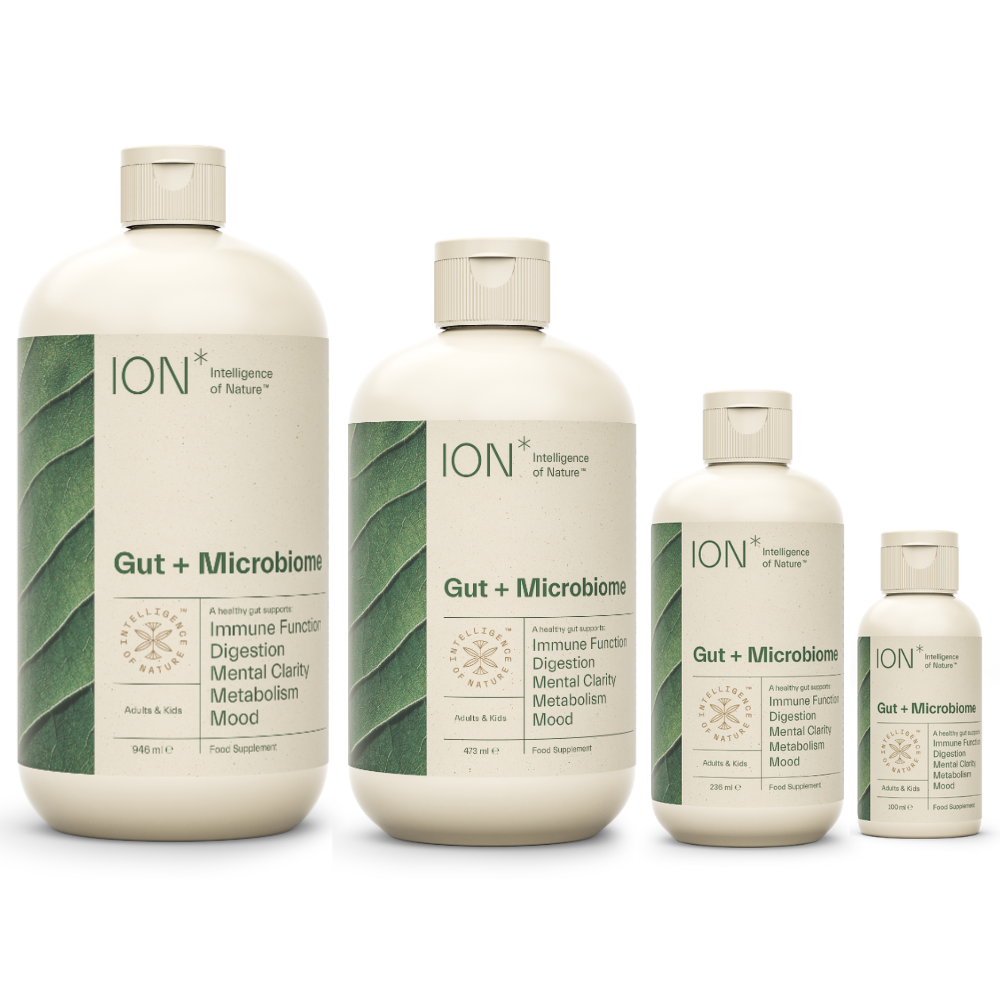The Gut-Brain Axis
Consider this, there are no shortage of idioms about gut feelings: butterflies, intuition, “trust your gut”, “feel it in your waters”, gut instinct. For an organ normally considered responsible solely for digestion, we certainly have a lot of phrases that make it sound as if the gut has a mind of its own.
Well, it turns out that this isn’t coincidental. Your gut sort of does have a mind of its own.
That’s your gut-brain axis.
In the scientific community, some have taken to calling the gut-brain axis “the second brain” colloquially or the “Enteric Nervous System” (ENS) a bit more formally.
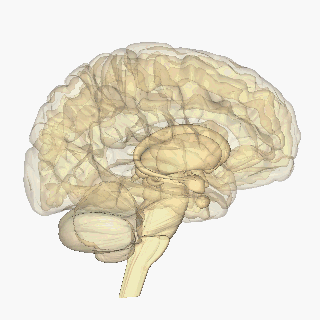
So, what is the gut-brain axis, exactly?
This vast communication network is made up of more than 100 million nerve cells that line your entire gastrointestinal tract and it actually, little known fact, starts in your sinuses, not your stomach. Often called the “second brain,” this system acts as a powerful communication hub for your whole body, influencing everything from digestion to mood and immunity.
When this network falls out of balance, the body’s internal messages can get scrambled, setting the stage for a range of health issues.
One key player in this system is the vagus nerve, a major connector between your brain and your gut. Recent research shows that psychological stress can disrupt the vagus nerve’s ability to relay signals in both directions, a breakdown that can contribute to gastrointestinal conditions such as IBS.

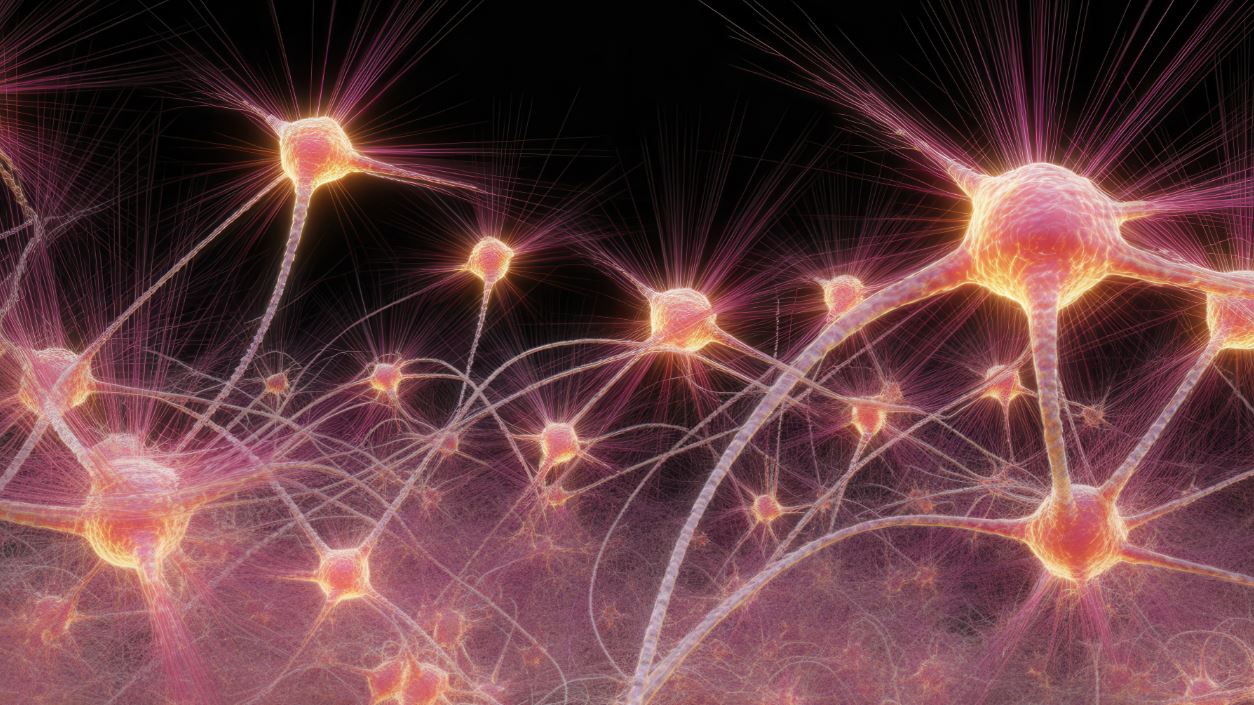
What does the gut-brain axis do?
The Gut-Brain Axis: Why do we have one?
Although research into the gut–brain axis is still evolving, one thing is becoming increasingly clear: this connection plays a vital role in our overall health and well-being.
One of the most fascinating discoveries is that a large share of the body’s neurotransmitters, including serotonin and dopamine, are actually produced in the gut, not the brain. These chemical messengers are the language through which your gut and brain communicate. They regulate mood, drive emotional responses like the “fight or flight” reaction and influence everything from blood flow and digestion to immune function and nutrient absorption.
When neurotransmitter balance is disrupted, that communication starts to falter. This can trigger inflammation and gut-related disorders and emerging research suggests it may even contribute to neurological or mental health conditions.
In fact, because the gut and brain are so deeply intertwined, poor gut health has been linked to the development and progression of issues such as depression, schizophrenia, autism, epilepsy and migraines. Conversely, people with a healthy gut tend to be more resilient to stress and better equipped to maintain emotional balance.
The key to understanding this connection lies in the microbiome, the thriving ecosystem of bacteria, fungi, and other microorganisms that live within us. This community begins forming at birth and continues to shape our health throughout life. Studies show that early-life disruptions to the microbiome, from antibiotic use, limited breastfeeding, infections, or chronic stress, can have long-lasting effects on both physical health and brain function.
These early influences can alter the gut–brain axis, shaping how our bodies and minds respond to the world for years to come.
When the Gut-Brain Axis is Compromised
The gut microbiome develops alongside the central nervous system, forming one of the body’s most important communication networks from the very beginning of life. But early development isn’t the only time this system can be influenced.
Throughout our lives, countless factors, from diet and environment to medications like antibiotics, continually shape and reshape our gut microbiota.
Put simply: what’s bad for your gut is bad for your gut–brain axis.
Poor nutrition, chronic stress, antibiotics, gluten sensitivity, environmental toxins like glyphosate and even genetic factors can all disrupt the delicate balance of the gut. When that balance falters, the gut–brain axis struggles to function properly and that imbalance can ripple throughout the body, affecting everything from mood and metabolism to immunity and cognitive health.
Emerging research suggests that a disrupted gut–brain axis can even influence eating behaviour and weight regulation. One 2020 study found that when this system is out of sync, it can heighten cravings for sugary foods, making that extra biscuit even harder to resist.
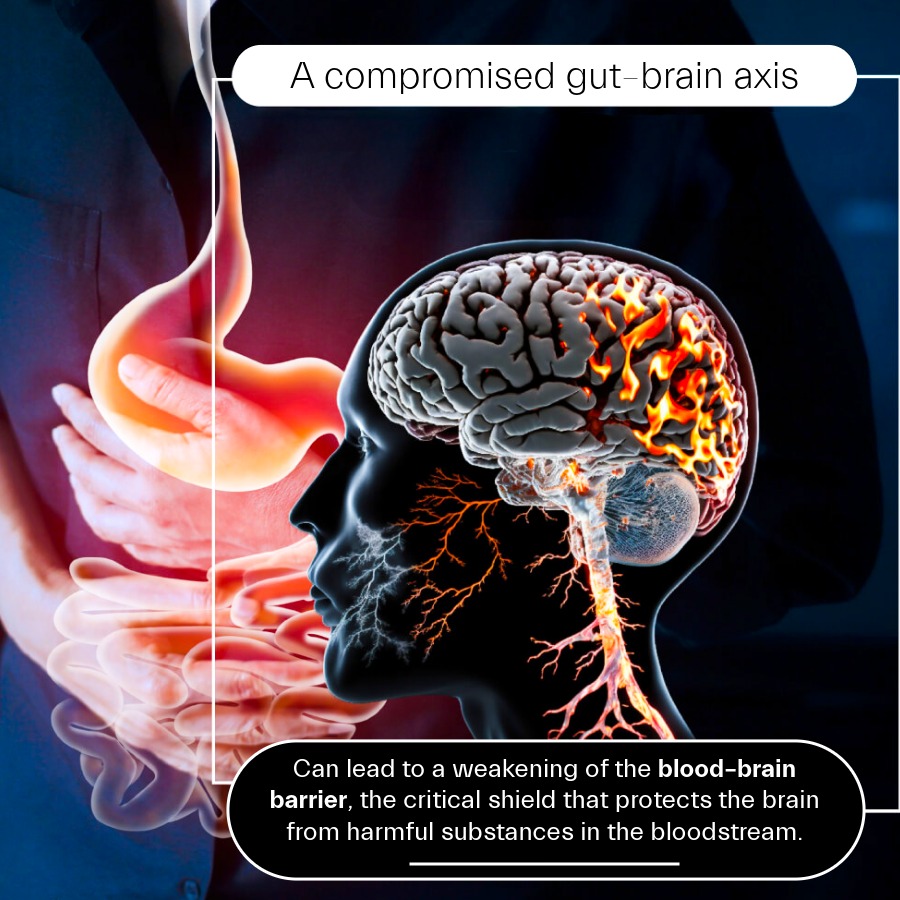
The implications, though, go far beyond food cravings. A compromised gut–brain axis may also weaken the blood–brain barrier, the critical shield that protects the brain from harmful substances in the bloodstream. When this barrier becomes more permeable, it can trigger inflammation in the brain, a process increasingly linked to neurodegenerative conditions such as Alzheimer’s and Parkinson’s disease.
How to Strengthen (and Protect) Your Gut–Brain Axis
If you want to support your gut–brain axis, the best place to start is with your gut itself. And one of the simplest, most powerful ways to do that is through your diet.
Dr Megan Rossi, founder of The Gut Health Doctor, explains:
“For a simple way to improve your gut health naturally, aim for at least 30 different plant-based foods each week, packed with fibre and beneficial plant chemicals. The more diversity, the better.”
A diverse diet feeds a diverse microbiome and a thriving microbiome helps your gut–brain axis function at its best. As you build your meals, focus on foods known to support gut health and brain communication:
1) Omega-3 Fatty Acids
Essential fats your body can’t make on its own, omega-3s are found in foods like walnuts, flaxseeds, and oily fish. They help strengthen cell membranes, support metabolism and cardiovascular health and may even lower the risk of brain disorders.
2) Fermented Foods
Yoghurt, kefir, kimchi, sauerkraut and miso are rich in beneficial microbes, including lactic acid bacteria, which promote healthy gut flora and improve digestion.
3) High-Fibre Foods
Whole grains, nuts, seeds, fruits and vegetables provide prebiotic fibre, the favourite food of your gut bacteria. Feeding them helps maintain a balanced microbiome and may even help regulate stress hormones.
4) Polyphenol-Rich Foods
Polyphenols are plant compounds with powerful anti-inflammatory and antioxidant properties. They help boost healthy gut bacteria and support brain function. You’ll find them in cocoa, green tea, berries, and extra virgin olive oil.
5) Tryptophan-Rich Foods
This amino acid helps your body produce serotonin, the “feel-good” neurotransmitter. Tryptophan is found in foods like nuts, seeds, oats, eggs and bananas.
How can ION* Gut + Microbiome help the gut-brain axis?
Unlike your diet, which most likely changes from day to day and, let’s be honest, can’t be perfect all the time (even organic foods can expose you to gut-harming glyphosate and other toxins), ION* can help support your gut health every day.
ION* is unlike any other supplement or wellness solution. Where probiotics and prebiotics add new things to your gut – and even “good” bacteria can be a bad problem – ION* works completely differently.
ION* Gut + Microbiome works by communicating to your gut on the cellular level, tightening critical junctions in the intestinal lining that are necessary for your gut to function at its best. This approach helps boost your own unique and innate gut health and also helps support your all-too-important gut-brain axis function, as well. It’s a win-win.
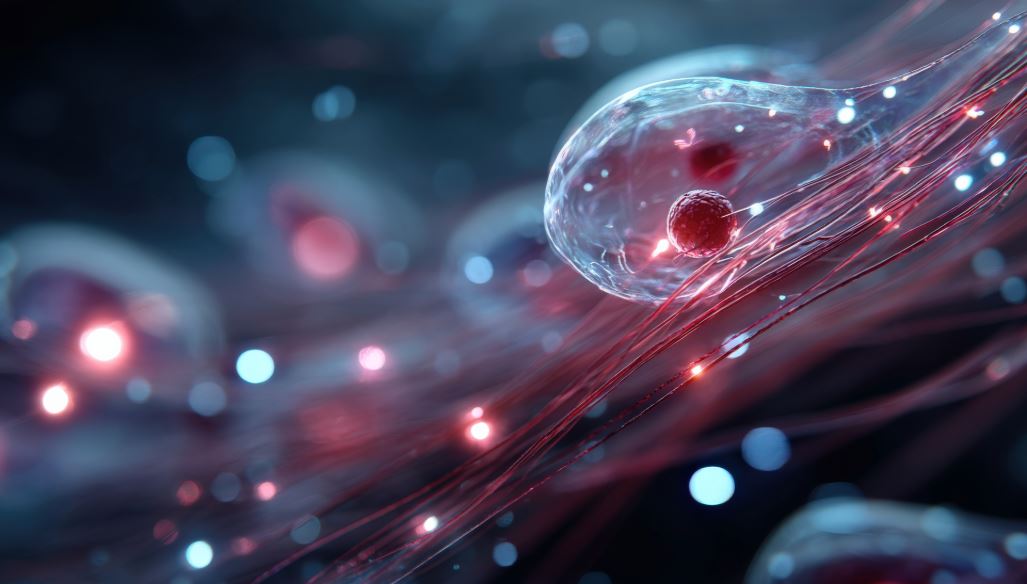
How ION* Gut + Microbiome Works
The Science of Redox Signalling
Every cell in your body communicates through redox signalling, electrical exchanges that instruct cells when to repair, regenerate or defend. The molecules in ION* act as cellular messengers, helping to restore this natural communication network within the gut lining.
When communication is strong, tight junctions can open and close intelligently, maintaining a healthy barrier that allows nutrients in while keeping toxins out. This balanced permeability supports:
- Improved nutrient absorption
- Stronger immune resilience
- Reduced inflammatory signalling
- Healthier microbiome diversity
In other words, ION* doesn’t override your system – it reminds it how to function.
Strengthening the Gut–Brain–Immune Axis
Because your gut lining is connected to every major system, from the immune network to the brain via the vagus nerve, restoring its integrity supports far more than digestion.
ION* helps to:
- Reconnect gut–brain communication, improving mood and focus
- Support immune balance, reducing unnecessary overreactions
- Encourage a calmer nervous system through better serotonin and GABA production
- Promote systemic resilience, from skin to energy to metabolism
This inside-out approach nurtures your body’s innate intelligence rather than overriding it. A truly regenerative path to health.
Core benefits of a healthy gut
Toxin protection
Your body’s defence understands it is to allow essential nutrients to pass through while blocking harmful toxins. However, these defences need to be robust. ION* has been proven to enhance the body’s internal communication pathways, supporting the integrity of tight junctions. By fortifying these tight junctions, your body’s natural barriers are reinforced at a cellular level, thus enhancing the effectiveness of your immune system at its core.
Immune function
Your immune system’s function is to identify and eradicate pathogens, and that process begins at your body’s barriers to the outside world. Research indicates that 70% or more of the body’s pathogen-fighting white blood cells reside in the gut. By sparking the body’s natural ability to keep your barriers strong, pathogens are obstructed before your immune system is exposed to their damaging effects.
Microbiome support
Just like you, your microbiome needs a healthy, hospitable environment to thrive. Think of your skin, gut lining, and nasal passages as terrains – upon which the health of your microbiome depends. This is where we come in. By supporting the terrain (cellular integrity), ION* facilitates the body to create microbiome health at its literal foundation.
Cellular hydration
Healthy membranes (skin, gut, sinuses) facilitate movement of minerals and nutrients across cell membranes, also pulling in water. By improving cellular integrity and reinforcing those membranes, the body can better regulate water absorption.
Stronger tight junctions = better nutrient absorption and hydration.
Collagen production
Collagen is most associated with improving elasticity, supporting hydration, and reducing signs of aging in the skin. However, the benefits of healthy collagen formation go far deeper, helping with everything from muscle strength to joint pain to heart health. ION* has been scientifically shown to support lysine production – one of the fundamental precursors of collagen formation.
The Science of ION* Gut + Microbiome
The science behind ION* lies in the strengthening of the cellular integrity of your body’s barriers. Keeping your cells connected keeps these barriers intact, which sets the foundation for seamless interaction between you and your microbiome.
Further insight can be found in these studies.
Blood-brain barrier response
Explores the connection between the microbiome and the gut and blood-brain barrier systems, as well as the improved effect that ION* has on the blood-brain barrier.
Glyphosate protection
Studies the capacity of ION* to block glyphosate-mediated injury in small intestinal and colon epithelial membranes.
Gluten impact
Explores the addition of ION* stabilising tight junction integrity, even in the face of gluten exposure.
Clinical Studies
In addition to peer-reviewed studies, ION* conducted two foundational double-blind, placebo-controlled clinical trials that studied the ability of ION* Gut + Microbiome to promote innate health in two important ways: lysine production and immune function.
Lysine Trial
ION* Gut + Microbiome promotes the lysine production in healthy subjects, likely by stimulating intestinal microbiota production and intestinal transport of this critical regulatory amino acid.
These findings elucidate one of the likely mechanisms by which Terrahydrite® supports tight junction protection and repair following gluten or glyphosate injury and sheds light on the in vivo function of Terrahydrite® to support intrinsic pathways of protein production, cell repair and immune function.
Immune Trial
Clinical findings demonstrated that ION* Gut + Microbiome supplement markedly reduced urinary levels of the inflammatory marker IL-6, the tight junction modulator zonulin and the pesticide glyphosate in adult health subjects, even in a short two-week supplement course.


